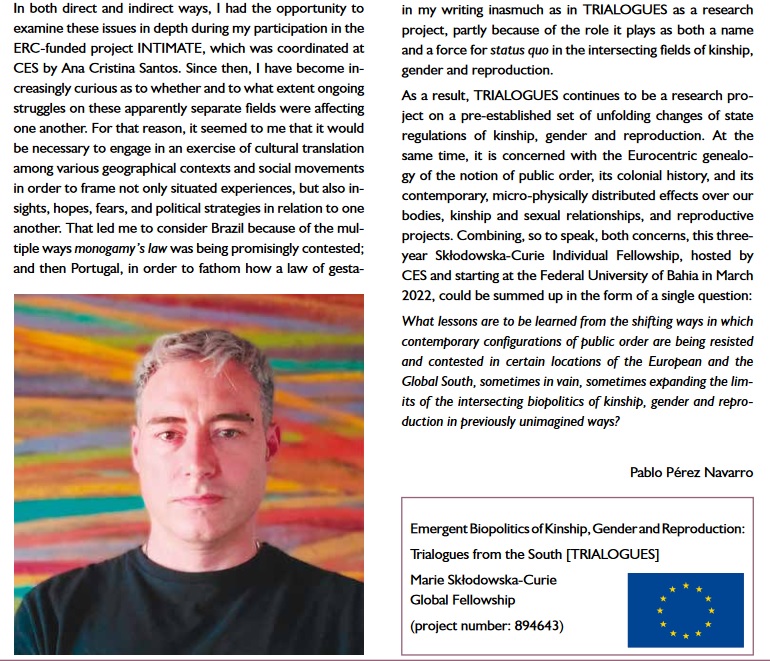Views: 79
Mídia
CES em Cena ´59: TRIALOGUES from the South
Pablo Pérez Navarro
TRIALOGUES from the South - CES em Cena ´59 Much has changed since I wrote the first draft of TRIA- LOGUES. Initially, it was conceived to explore emergent processes of transformation of state regulations of certain aspects of bodily and sexual life or, dare I say, of life in a more general sense. I was thinking, more specifically, about the challenges facing monogamy as a legal and a social norm in various locations, on the surrogacy wars dividing feminists and queer activists around me, and on the shifting ways in which trans people defy institutionalized forms of state vio- lence. In both direct and indirect ways, I had the opportunity to examine these issues in depth during my participation in the ERC-funded project INTIMATE, which was coordinated at CES by Ana Cristina Santos. Since then, I have become in- creasingly curious as to whether and to what extent ongoing struggles on these apparently separate fields were affecting one another. For that reason, it seemed to me that it would be necessary to engage in an exercise of cultural translation among various geographical contexts and social movements in order to frame not only situated experiences, but also in- sights, hopes, fears, and political strategies in relation to one another. That led me to consider Brazil because of the mul- tiple ways monogamy’s law was being promisingly contested; and then Portugal, in order to fathom how a law of gesta- tional surrogacy was being “born”; and finally Spain, where trans activism appeared to be on the verge of overcoming crucial obstacles on the way to gender self-determination. Then, important forms of moral backlash occurred along with the COVID pandemic – sometimes even reinforcing each other in unexpected ways. Monogamy was judicially reinforced in Brazil; the surrogacy law became a couple- centered, heteronormative move of the Portuguese left; and institutional feminism revealed its most conservative and trans-exclusionary face in Spain, limiting the reach of a much-expected gender identity law in many important ways. That was the context in which a specific legal concept — the notion of public order — became increasingly central in my writing inasmuch as in TRIALOGUES as a research project, partly because of the role it plays as both a name and a force for status quo in the intersecting fields of kinship, gender and reproduction. As a result, TRIALOGUES continues to be a research pro- ject on a pre-established set of unfolding changes of state regulations of kinship, gender and reproduction. At the same time, it is concerned with the Eurocentric genealo- gy of the notion of public order, its colonial history, and its contemporary, micro-physically distributed effects over our bodies, kinship and sexual relationships, and reproductive projects. Combining, so to speak, both concerns, this three- year Skłodowska-Curie Individual Fellowship, hosted by CES and starting at the Federal University of Bahia in March 2022, could be summed up in the form of a single question: What lessons are to be learned from the shifting ways in which contemporary configurations of public order are being resisted and contested in certain locations of the European and the Global South, sometimes in vain, sometimes expanding the lim- its of the intersecting biopolitics of kinship, gender and repro- duction in previously unimagined ways? Pablo Pérez Navarro

